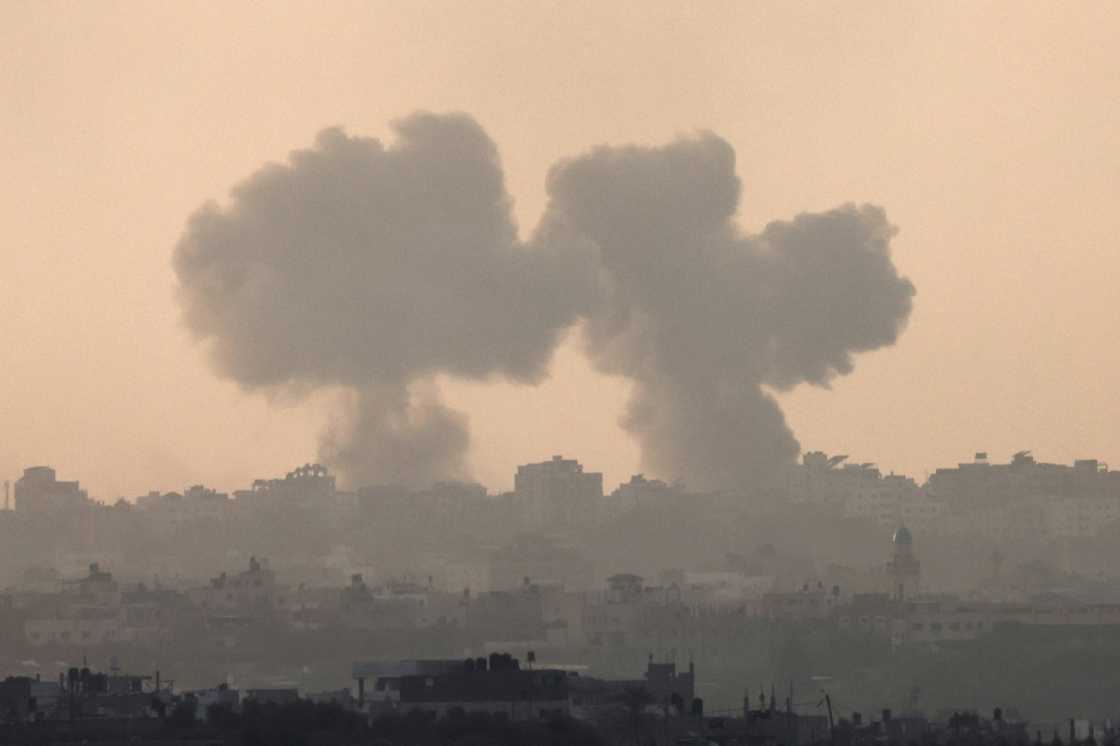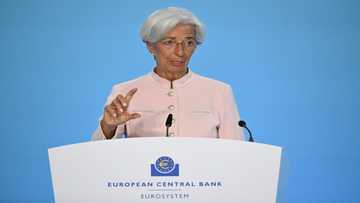Equities drop as traders keep wary eye on Middle East crisis

Source: AFP
PAY ATTENTION: Be the first to follow YEN.com.gh on Threads! Click here!
Asian markets extended last week's sell-off Monday on fears of a regional conflict in the Middle East and worries that US interest rates will remain elevated for longer than initially thought.
Still, oil dipped as Israel's expected ground offensive against Hamas in Gaza was delayed, with diplomats trying to secure the release of more hostages and some suggesting this could change Tel Aviv's strategy.
Uncertainty caused by the crisis -- sparked by Hamas's deadly October 7 attack, followed by weeks of Israeli bombardment of Gaza -- has seen risk assets tumble with the Vix fear gauge hitting its highest level since March.
Israel warned Iran-backed Hezbollah risked dragging Lebanon into the conflict after reporting anti-tank missiles were fired again from the country Sunday.
While the fear remains that other countries including Iran could be drawn into a regional conflagration, the decision to hold off a ground attack, after weeks of bombing, has provided a shaft of light, pushing crude lower.
Oil is "taking a breather while the focus (is) on humanitarian aid and securing hostage releases suggest that a potential ground invasion from Israel can wait", Yeap Jun Rong at IG Asia said.
PAY ATTENTION: Сheck out news that is picked exactly for YOU ➡️ click on “Recommended for you” and enjoy!
"That may contain the risks of further escalation, at least for now."
Both main contracts were down at least one percent Monday.
Equity traders extended their US counterparts' selling, with Tokyo, Sydney, Seoul, Shanghai, Singapore, Taipei, Mumbai, Manila and Jakarta deep in the red.
Hong Kong was closed for a holiday.
London sank at the open, while Paris and Frankfurt edged higher.
"Events over the weekend have offered some hope of compromise with the release of two Israeli hostages, and the start of some aid convoys into Gaza, prompting some modest weakness in crude oil and gold prices," said CMC Markets analyst Michael Hewson.
"However, the exchange of fire between Israel and Hamas has continued, while the prospect of a new front on the Lebanese border remains an ever-rising concern."
The uncertainty was also keeping the dollar higher against its peers, and briefly broke 150 yen on bets the Federal Reserve will hold interest rates at their two-decade highs for some time as officials battle inflation.
The moves have revived talk of an intervention by Japanese authorities to support their currency.
However, observers said that while a report at the weekend said the Bank of Japan could tweak its ultra-loose monetary policy the yen would remain under pressure owing to the Fed's elevated borrowing costs.
The dollar's strength comes as 10-year Treasury yields, seen as a proxy for future rates, sit near 16-year highs.
"The main question dominating global financial markets, particularly for Asian capital markets, is whether the sell-off in US Treasuries will subside or persist," said Stephen Innes of SPI Asset Management.
"The trajectory of US Treasuries is not merely a question; it is the only question for financial markets," he added.
"US government bonds are the critical benchmark reference point against which virtually all other global assets are ultimately priced off."
Meanwhile, the Fed warned Friday in its half-yearly report on financial stability that geopolitical tensions -- particularly in the Middle East and Ukraine -- could push inflation back up and hurt the global economy.
"Escalation of these conflicts or a worsening in other geopolitical tensions could reduce economic activity and boost inflation worldwide," it said.
Key figures around 0710 GMT
Tokyo - Nikkei 225: DOWN 0.8 percent at 30,999.55 (close)
Shanghai - Composite: DOWN 1.5 percent at 2,939.29 (close)
London - FTSE 100: DOWN 0.2 percent at 7,386.09
Hong Kong - Hang Seng Index: Closed for holiday
Dollar/yen: UP at 149.928 yen from 149.84 yen on Friday
Euro/dollar: DOWN at $1.0586 from $1.0598
Pound/dollar: UP at $1.2165 from $1.2164
Euro/pound: DOWN at 87.01 pence from 87.17 pence
West Texas Intermediate: DOWN 1.2 percent at $87.05 per barrel
Brent North Sea crude: DOWN 1.0 percent at $91.25 per barrel
New York - Dow: DOWN 0.9 percent at 33,127.28 (close)
New feature: Сheck out news that is picked for YOU ➡️ click on “Recommended for you” and enjoy!
Source: AFP




